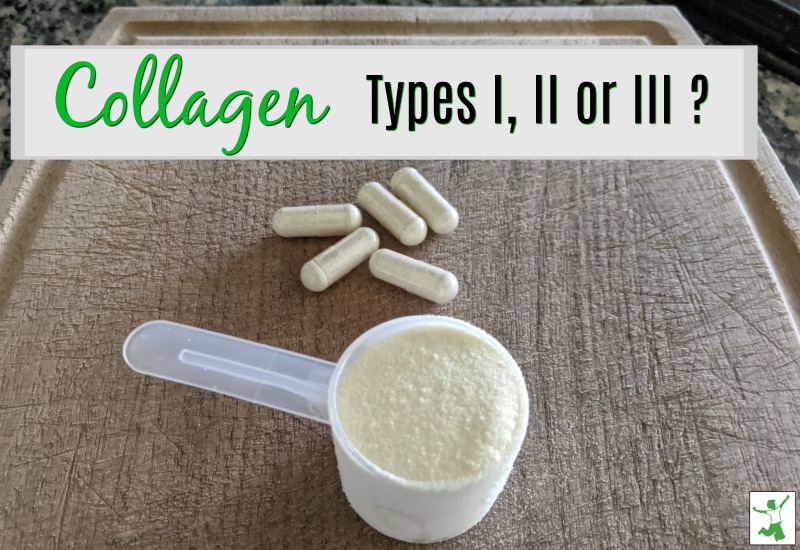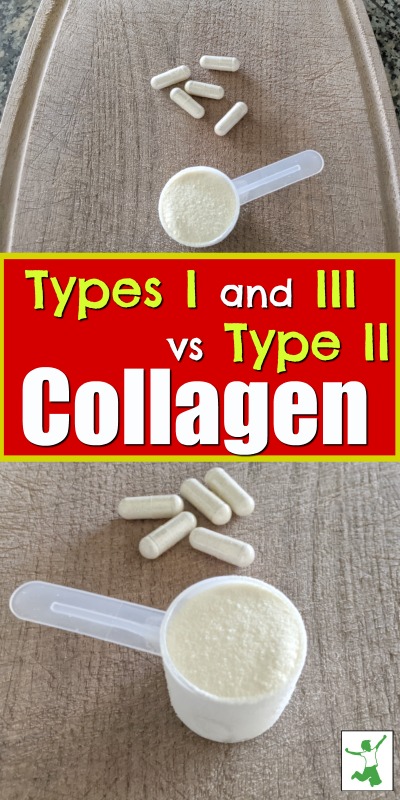
Collagen is a big buzzword in supplements and beauty products today and with good reason. It is the most abundant protein in our bodies! Critical to the normal function of numerous metabolic processes, this biological glue that holds us together worrisomely decreases with age.
Depending on genetic, environmental and dietary factors, the pace of collagen decline can occur at varying rates of speed.
Many of the signs of reduced levels are obvious. Joint problems, a sagging jawline, fine lines, and wrinkles come to mind. Crepey skin is another visible manifestation of collagen levels on the decline.
While you can’t completely stop this process, you can most definitely slow it down.
Three Main Types of Collagen
What many collagen fans do not realize is that there are three main types of collagen: Type I, II and III.
Together, these three forms make up approximately 90% of all the collagen in our bodies.
The question is, which type is best for the health goals you wish to accomplish?
In other words, you don’t want to be taking collagen that helps skin when you are trying to heal from a sprained ankle!
Peptides: Type I and Type III Collagen
The skin, hair, nails, and bones contain primarily Type I and Type III collagen.
In supplemental form, hydrolyzed “peptides” offer these types of collagen.
They are also found in traditional bone broths, particularly when you include the skin in the simmering mixture!
If buying collagen in convenient powdered form, the safest brands are certified by an independent third party to be glyphosate free. Contamination with the herbicide glyphosate is a huge problem even in grass-fed products. This chemical is known to harm beneficial gut bacteria, which in turn, compromises the immune system.
How does this happen? Grassfed cattle, even from organic operations, can be exposed via the widespread contamination of waterways/wind contamination of pastures from conventional crops doused with Roundup that may be in the vicinity.
This brand is the only collagen peptides independently certified to be glyphosate free as of this writing. This means NO glyphosate is detected (0.01 ppm) via routine testing throughout the year. This compares with some peptides that are tested by the manufacturer itself and are found to be under the FDA limits for safety but still register as containing detectable Roundup residues.
Type II Collagen for Healthy Joints
Some people who use collagen peptides assume that it is helpful for joint care as well.
While consuming Type I and Type III collagen via peptide powders certainly won’t hurt, providing the building blocks for joint repair and ongoing maintenance requires a different kind of collagen…Type II.
Of the various sources for Type II collagen on the market, bovine cartilage is the kind to look for. Again, be sure it is certified to be glyphosate free by independent third-party testing.
Another suggestion is to check is that the Type II collagen you use is fairly traded and sustainably harvested.
Bovine Cartilage
As a source of undenatured Type II collagen, bovine cartilage is an excellent choice as it provides co-factors that facilitate its optimal metabolic utilization including:
- Chondroitin Sulfate – believed to enhance the shock-absorbing properties of collagen and block enzymes that break down cartilage. (1)
- Proteoglycans – critical for the health and integrity of the structure of connective tissues. (2)
- Glycosaminoglycans – connective tissue components that support collagen elasticity between cells and promote the ability of joint fibers to retain moisture. (3)
- Bioactive Growth Factors – intracellular signaling molecules that encourage joint repair. (4)
- Immune system regulators – proteins that modulate T cells. When out of balance, can be a factor causing inflammation and breakdown of tissues. (5)
- Trace minerals and other micronutrients
What Type of Collagen is Best?
In summary, there is no “best” type of collagen. All types…I, II, and III are necessary to maintain healthy skin, hair, nails, bones, and joints.
If you are seeking better skin and improved hair/nail strength, (hydrolyzed) collagen peptides (Type I and III) are optimal.
For recovering from injury, reduce inflammation and regain joint mobility and function, bovine cartilage (Type II) is your best bet.
For safety reasons, it is a good practice to choose a brand (I use this one) that is pure and free of glyphosate residue as tested throughout the year under various weather/grazing conditions by an independent third party.









You state that you take a particular collagen supplement and have a link to the site on yours. But that product is only collagen types 1 and 3. Where can I get type 2?
This Type II collagen was linked in the article. https://www.thehealthyhomeeconomist.com/go/bovine-cartilage/
Sarah,
I have read that hydrolyzed collagen products are made primarily from hides, and many, if not most are leftovers from the tanning industry. Would you address this, please? And also discuss the process by which the collagen is obtained from bovine hides to create these products? Aren’t harsh chemicals required? I know the product line you (and I) use specifies they are hides from grass fed cattle … but I’m still very uncomfortable (lack of knowledge) with the processing to end up with a white powder.. and if these “grass fed” cattle hides are coming from the tanning industry.
The brands I recommend do not do this. I would not use collagen from an unvetted brand.
A friend just told me that her research indicated that using type II inhibits the absorption of types I and III, so we should only the one that is type I and III. I have the ancient nutrition brand that has I, II, III, V and X. What are the benefits supposed to be of the V and X (fish and egg membrane)? Thank you,
This brand is not clean and independently certified from The Detox Project like other brands are. https://www.thehealthyhomeeconomist.com/glyphosate-free-collagen/
Is it safe for pregnant women to take collagen?
I am trying to find out if the Collagen type 2 (which contains chondrotin sulfate) is safe during pregnancy. I take the brand of collagen peptides from perfect supplements daily even during pregnancy and nursing my 19month old son. I tried taking the type 2 from perfect supplements this week and within two days I can move my fingers! The results are amazing. My pain is pretty much gone. There seems to be no data on using it during pregnancy and nursing though. In case I do get pregnant while using both types of collagen (the scoops and 4 of type 2) a day. Have you been able to find any data on this? I want to keep taking them if possible.
I make my own bone broth, so I’m getting Type I & III collagen, but how can I get Type II collagen for my joints without buying it? Can I source it myself from my own grass-fed beef?
If you make homemade bone broth properly with lots of gelatin, you can get it that way without buying it.
Can I take 1-2 scoops of collagen peptides AND 4 capsules of type 2 every day?
Yes you can if you are taking collagen both for skin/hair/nails and joint health.
small typo in this paragraph (s/b Type III):
While consuming Type I and Type II collagen via peptide powders certainly won’t hurt, providing the building blocks for joint repair and ongoing maintenance requires a different kind of collagen…Type II.
Thanks for pointing that out! I will fix it asap 🙂